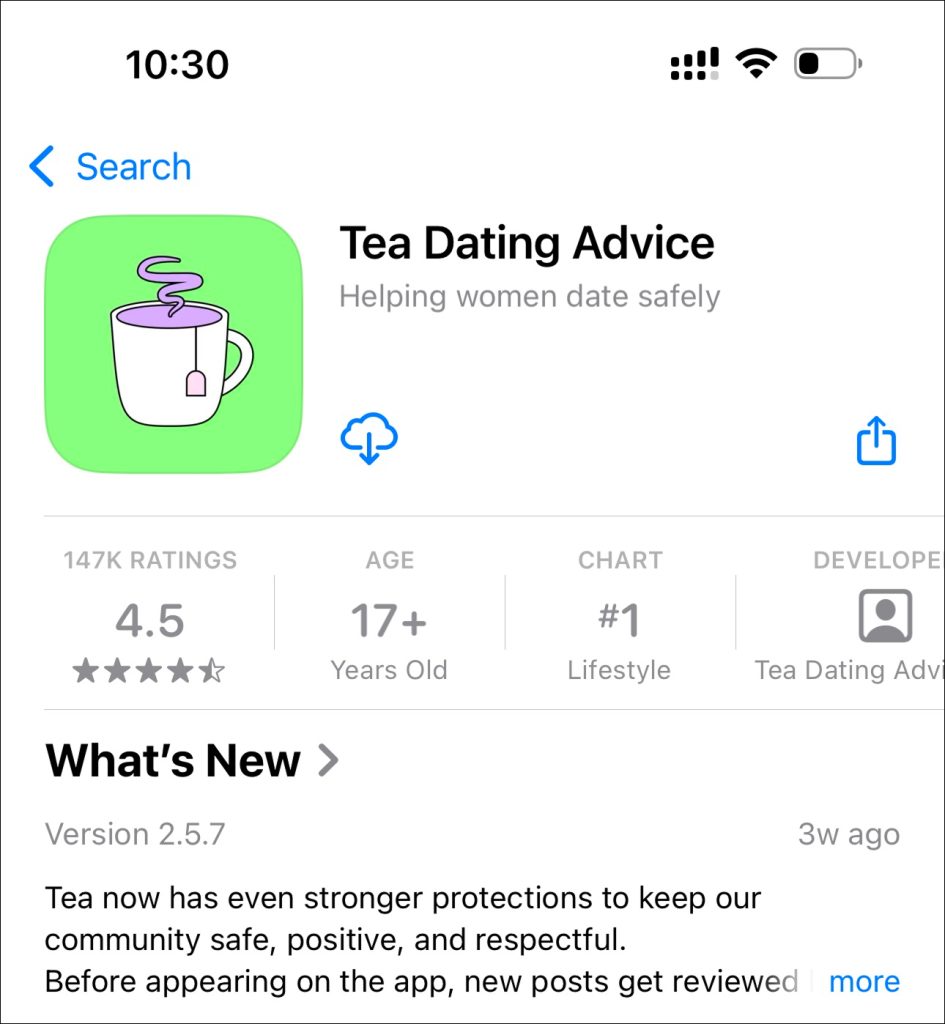The Tea app has become one of the most talked-about apps of 2025 — praised for empowering women in the dating world, but also criticized for its privacy and security risks. Here’s a full look at what Tea is, how it works, why it went viral, and the controversies surrounding it.
What is Tea?
Tea is a women-only dating advice and safety app where users can anonymously share their dating experiences, post about men they’ve dated, and warn or recommend others. Think of it as a digital version of a “whisper network” — traditionally private conversations among women about who to trust and who to avoid.
The app’s core purpose is safety and community support, allowing women to identify red flags in dating and avoid unsafe or manipulative situations.
Key Features of the Tea App
1. Women-Only Membership
- To join, users must verify they are women (originally with both an ID and selfie; later only selfie verification remained).
- This exclusivity builds trust and encourages open sharing.
2. Anonymous Posting
- Women can upload a man’s photo, name, or dating profile screenshot.
- Posts often detail personal experiences such as ghosting, cheating, lying, or abusive behavior.
- Positive experiences can also be shared to highlight “green flags.”
4. Community Ratings
Other users react by tagging men as either:
- Green Flag ✅: Good behavior, trustworthy, recommended.
- Red Flag 🚩: Warning sign, manipulative, unsafe, or not recommended.
5. Safety & Verification Tools
- Reverse-image AI to detect catfishing and fake profiles.
- Background check features (phone number lookups, criminal record searches, sex offender registry maps).
- Many tools are free, while premium safety checks are part of a paid subscription (around $15/month).
6. Community Support (Tea Parties)
- Group chat forums where women exchange advice, share dating stories, and support each other.
- Users can set up alerts to be notified if certain men are mentioned in posts.
Rise to Popularity

- Launched in 2023, Tea started small but saw explosive growth in 2025.
- By mid-2025, it topped the App Store lifestyle charts with millions of downloads.
- Social media (especially TikTok and Instagram) fueled virality, with women posting their experiences of using Tea and encouraging others to join.
- Tea resonated because it offered something new: a crowdsourced safety net in a dating world full of uncertainty.
Controversies and Criticisms
Despite its popularity, Tea has faced major criticism from privacy experts, legal analysts, and even some users:
1. Privacy & Defamation Risks
- Anyone can be named, pictured, and described on the app without their consent.
- Men have raised concerns about reputational damage from unverified claims.
- Experts warn that the app can be misused for doxxing or revenge posts.
2. Security Breaches
Tea has suffered two massive data leaks in 2025:
- July 2025 Leak: About 72,000 images (selfies, ID verification photos, and post images) were exposed online.
- Second Leak: Over 1.1 million private messages were leaked, revealing sensitive discussions about abortion, infidelity, sexual health, and personal phone numbers.
- Investigations revealed poor data handling, such as unencrypted databases and retention of user data beyond stated deletion policies.
3. Legal Fallout
- By August 2025, Tea faced at least 10 class-action lawsuits in the U.S.
- Cases focused on negligence in handling user data, breach of privacy, and the app’s potential role in spreading false or harmful claims.
4. Ethical Debate
- Supporters argue Tea saves lives by empowering women to spot patterns of dangerous behavior and avoid abusive partners.
- Critics label it “digital vigilantism,” warning it encourages unverified allegations that could ruin reputations.
- Media coverage has been split: some hail it as revolutionary, others call it reckless.
Why The Tea App Matters
Tea reflects a broader shift in online dating culture: people want community-driven safety tools, not just matchmaking. It shows the demand for platforms that go beyond swiping — offering real-world safety nets, accountability, and shared experiences.
But Tea also serves as a warning: apps handling sensitive information must prioritize privacy, consent, and security. Without this, even the most empowering ideas can quickly turn risky.
Can I sue the Tea app?
One of the biggest legal questions around Tea is who is responsible for the content posted on the app — the user who wrote it, or Tea itself. This is where Section 230 of the U.S. Communications Decency Act comes in.
- User-generated content (protected by Section 230):
If a woman posts about a man on Tea, including his photo or name, and makes claims that turn out to be false, Tea generally cannot be sued for defamation. Under Section 230, the legal liability rests with the user who created the post, not the app that hosts it. - Tea’s own actions (not protected by Section 230):
Section 230 does not shield Tea from lawsuits related to its own conduct. That means Tea can still face lawsuits for:- Data breaches (like the 2025 leaks that exposed 72,000 photos and 1.1M messages)
- Privacy violations (failing to delete data, misusing personal information)
- Misleading business practices (false claims about security or safety features)
- Legal gray areas:
Some critics argue Tea actively encourages users to post identifying information about men, blurring the line between simply “hosting” and “facilitating.” If a court ever ruled that Tea was playing too direct a role in shaping content, Section 230 protections could be challenged.
Section 230 makes it very hard to sue Tea for what users post, but it doesn’t protect Tea from lawsuits over how it runs the platform — especially its security, privacy, and data handling.
How to Remove Your Post from the Tea App
If you’ve posted something on Tea and want to delete it, or if you’ve been mentioned on Tea and want content about you removed, here’s what you should know:
1. Removing Your Own Post
- In-App Deletion:
- Open the Tea app.
- Go to your profile or account dashboard.
- Navigate to your posts or activity history.
- Select the post you want to remove.
- Tap the options menu (⋮ or “More”) and choose Delete Post.
⚠️ Some users have reported that deleted posts may still remain in Tea’s database, especially if the app has retained data beyond its stated deletion policy (this was one of the issues in the 2025 lawsuits).
2. Removing a Post About You (If Someone Else Posted It)
- Report the Post:
- Open the post and tap the Report button.
- Choose the reason (false information, harassment, privacy violation, etc.).
- Submit the report — Tea’s moderation team reviews flagged posts.
- Contact Tea Support Directly:
- Use the in-app help section or official website to submit a request for removal.
- Provide details like screenshots, URLs, or reasons why the post should be removed.
- Legal Option:
- If the post is defamatory, contains private information (like phone number, address, workplace), or violates privacy laws, you may have legal grounds to demand removal.
- Under U.S. law, Tea may be protected by Section 230 from defamation claims, but they still must comply with laws around privacy and data protection.
- In the EU or California, you may also be able to request removal under GDPR “Right to Erasure” or CCPA deletion rights.
3. Requesting Full Account & Data Deletion
If you want to permanently leave Tea:
- Go to Settings > Account > Delete Account.
- Confirm deletion (you may need to verify via email or app prompt).
- This should remove your posts from public view, but again, past data retention issues mean some data may remain on Tea’s servers.
Is There an App Like Tea for Men?

Juice is a community-driven dating advice and safety app built for men — essentially the men’s version of what Tea offers women. While Tea gives women a space to anonymously share experiences, warn each other of red flags, and celebrate positives, Juice provides men with the same opportunity but tailored to their needs.
On Juice, men can:
- Share experiences anonymously — tell your dating stories and get feedback.
- Give recommendations or not recommend — instead of Tea’s “green/red flags,” Juice uses a simple rating system designed for men.
- Stay safe — with privacy tools like automatic face blurring, reporting features, and background check options.
- Join group discussions — themed spaces where men talk about dating challenges, ghosting, first-date tips, and confidence building.
Like Tea, Juice is about community-powered insights. But it’s also about creating a safe, respectful, and supportive environment where men can learn from one another’s real experiences while protecting privacy.
Final Thoughts
The Tea app has become a cultural phenomenon — a bold attempt to create safety and solidarity for women in the modern dating landscape. At the same time, it has sparked serious questions about privacy, accountability, and digital ethics.
Whether you see it as a revolutionary safety tool or a dangerous experiment in online reputation, Tea has undeniably changed the conversation around dating, safety, and community in 2025.

